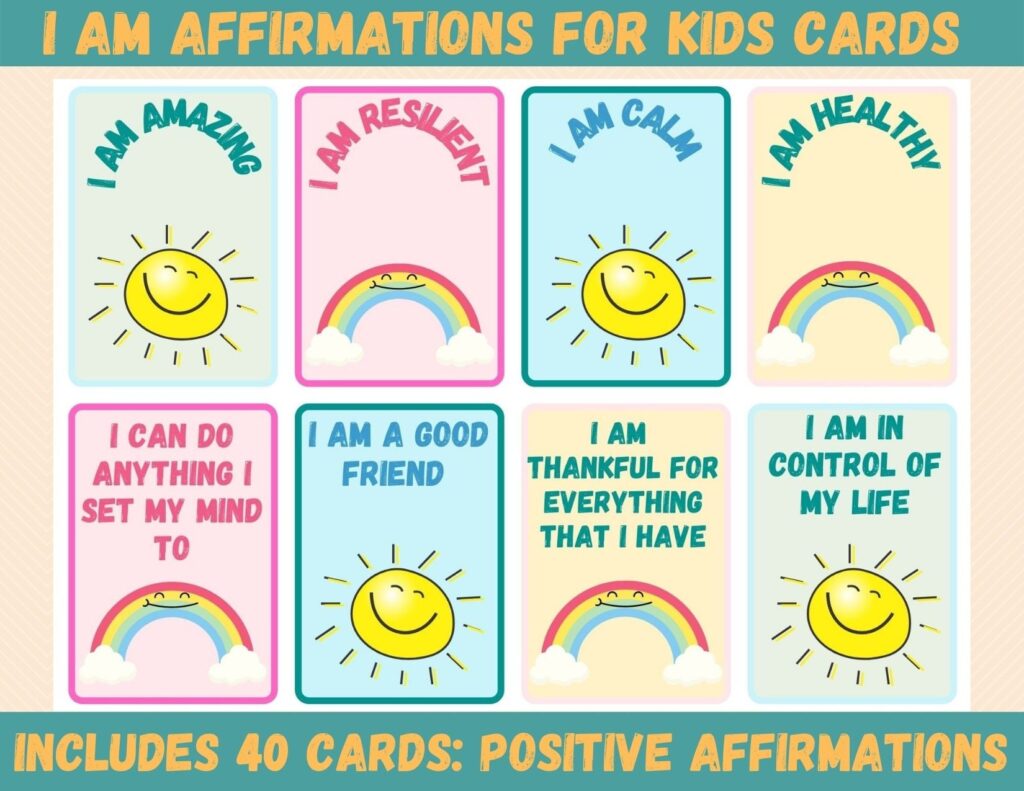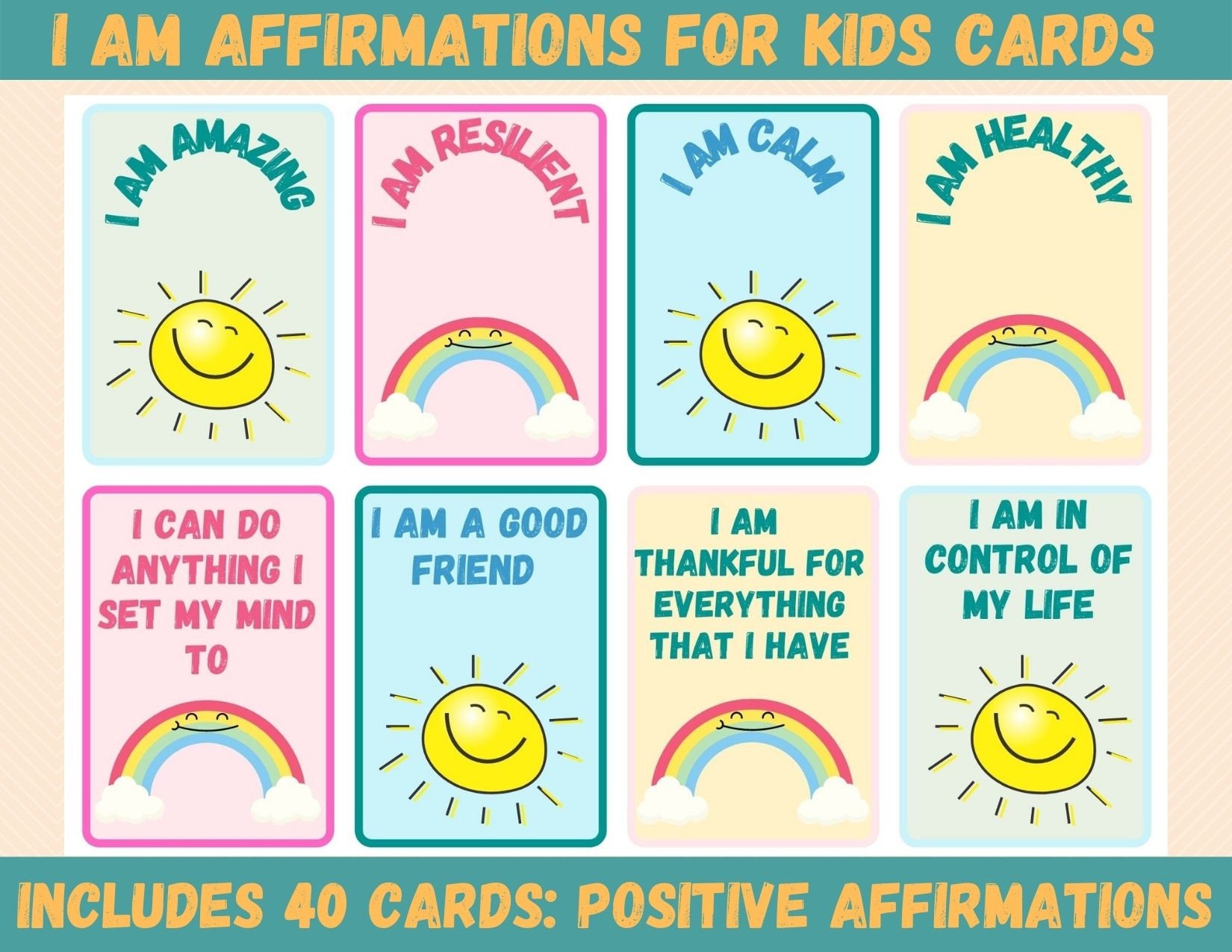
Empowering Young Minds: The Power of Positive Affirmations for Kids
In a world that often bombards children with negative messages and societal pressures, the practice of using positive affirmations for kids can be a powerful tool for fostering self-esteem, resilience, and a growth mindset. These simple, yet impactful statements, when repeated regularly, can reshape a child’s internal dialogue, helping them believe in themselves and their abilities. This article delves into the importance of positive affirmations for kids, providing practical examples and guidance on how to effectively incorporate them into a child’s daily routine.
Understanding Positive Affirmations
Positive affirmations are statements that describe a desired state or quality as if it already exists. They are designed to counteract negative thoughts and beliefs, replacing them with empowering ones. For children, who are still developing their sense of self and navigating the complexities of social interaction, positive affirmations for kids can be especially beneficial.
The science behind affirmations lies in the concept of neuroplasticity, the brain’s ability to reorganize itself by forming new neural connections throughout life. By consistently repeating positive affirmations, children can gradually rewire their brains to adopt a more optimistic and self-assured outlook. This process can lead to improved self-confidence, increased motivation, and a greater ability to cope with challenges.
Why are Positive Affirmations Important for Children?
The formative years are crucial for shaping a child’s self-perception and beliefs about the world. During this time, children are particularly susceptible to external influences, such as the opinions of their peers, teachers, and family members. Negative experiences or criticisms can easily lead to self-doubt and insecurity. Positive affirmations for kids provide a counterbalance to these negative influences, helping children develop a strong sense of self-worth and resilience.
- Boosting Self-Esteem: Positive affirmations for kids can help children recognize their strengths and accomplishments, fostering a sense of pride and self-acceptance.
- Reducing Anxiety and Stress: By focusing on positive thoughts, affirmations can help children manage anxiety and stress, promoting a sense of calm and well-being.
- Improving Academic Performance: When children believe in their ability to succeed, they are more likely to persevere through challenges and achieve their academic goals.
- Enhancing Social Skills: Positive affirmations can help children develop empathy, compassion, and respect for others, leading to more positive social interactions.
- Promoting a Growth Mindset: Affirmations can encourage children to embrace challenges, view mistakes as learning opportunities, and believe that their abilities can be developed through effort and dedication.
Examples of Positive Affirmations for Kids
The key to effective affirmations is to make them specific, meaningful, and relevant to the child’s individual needs and experiences. Here are some examples of positive affirmations for kids, categorized by different areas of focus:
Self-Love and Acceptance
- I am loved and valued.
- I am unique and special.
- I am proud of who I am.
- I accept myself completely.
- I am kind to myself.
Confidence and Courage
- I am brave and strong.
- I can do anything I set my mind to.
- I believe in myself.
- I am confident in my abilities.
- I am not afraid to try new things.
Resilience and Perseverance
- I am resilient and can overcome challenges.
- I learn from my mistakes.
- I never give up.
- I am persistent and determined.
- I can handle anything that comes my way.
Gratitude and Positivity
- I am grateful for all the good things in my life.
- I focus on the positive.
- I am happy and joyful.
- I choose to be optimistic.
- I see the good in everything.
Kindness and Compassion
- I am kind and compassionate.
- I treat others with respect.
- I am a good friend.
- I care about others.
- I am helpful and supportive.
How to Incorporate Positive Affirmations into a Child’s Routine
There are many creative and engaging ways to integrate positive affirmations for kids into their daily lives. The key is to make it fun and consistent.
- Morning Ritual: Start the day with a few positive affirmations. Have your child repeat them aloud while looking in the mirror. This sets a positive tone for the day and helps them start with a sense of confidence.
- Bedtime Routine: End the day with positive affirmations to promote relaxation and positive thinking before sleep. This can help children process their day and reinforce positive beliefs.
- Affirmation Cards: Create or purchase affirmation cards with different statements. Have your child choose a card each day and focus on that affirmation throughout the day.
- Visual Reminders: Post positive affirmations in visible places, such as on the refrigerator, in the bathroom mirror, or in their bedroom. These visual reminders will help reinforce the affirmations throughout the day.
- Affirmation Journal: Encourage your child to write down their positive affirmations in a journal. This can help them reflect on their thoughts and feelings and track their progress.
- Affirmation Games: Turn affirmations into a fun game. For example, you can play “Affirmation Bingo” or “Affirmation Charades.”
- Lead by Example: Children learn by observing their parents and caregivers. Model positive affirmations in your own life and share your own positive thoughts and beliefs with your child.
Tips for Using Positive Affirmations Effectively
To maximize the benefits of positive affirmations for kids, consider these tips:
- Keep it Simple: Use simple and easy-to-understand language.
- Be Specific: Tailor the affirmations to the child’s specific needs and challenges.
- Use “I” Statements: Encourage children to use “I” statements to personalize the affirmations.
- Focus on the Present: Frame the affirmations in the present tense, as if the desired state already exists.
- Repeat Regularly: Consistency is key. Encourage children to repeat their affirmations regularly, ideally every day.
- Believe in the Affirmations: Encourage children to believe in the affirmations and visualize themselves achieving their goals.
- Make it Fun: Keep the process engaging and enjoyable for the child.
Addressing Skepticism and Resistance
Some children may initially be skeptical or resistant to using positive affirmations. They may feel that the affirmations are not true or that they are not working. It’s important to address these concerns with empathy and understanding.
Explain to the child that positive affirmations are not about denying reality, but rather about changing their perspective and focusing on their strengths. Encourage them to start with small, believable affirmations and gradually work their way up to more challenging ones. Remind them that it takes time and practice to change their thinking patterns.
Also, consider involving the child in the creation of their own affirmations. This can help them feel more invested in the process and more likely to believe in the affirmations.
The Long-Term Benefits of Positive Affirmations
The benefits of using positive affirmations for kids extend far beyond childhood. By instilling a positive mindset and a strong sense of self-worth, affirmations can help children develop into confident, resilient, and successful adults. These benefits can include:
- Improved mental health and well-being
- Stronger relationships
- Greater academic and professional success
- Increased resilience in the face of adversity
- A more positive and optimistic outlook on life
Conclusion
Positive affirmations for kids are a valuable tool for nurturing self-esteem, resilience, and a growth mindset. By incorporating these simple yet powerful statements into a child’s daily routine, parents and educators can help children develop a strong sense of self-worth and the belief that they can achieve anything they set their minds to. In a world that often presents challenges and negativity, positive affirmations offer a beacon of hope and empowerment for young minds, setting them on a path towards a brighter and more fulfilling future. [See also: How to Build Confidence in Children] Regularly using positive affirmations for kids can truly change their lives.

